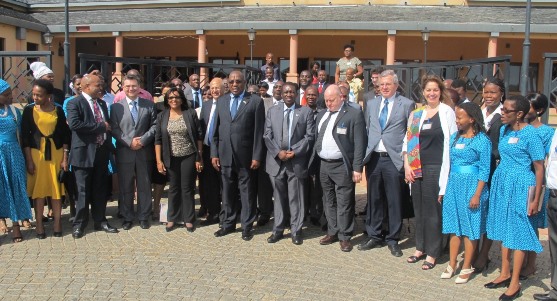|
|
 |
Prevention of illicit traffic of cultural goods; Workshop in Gaborone, Botswana 23-26 March 2015
Moving SADC forward by combating the Illicit Trafficking of Cultural and Natural Heritage in Southern Africa
|

|
|
The launch event of SADCHA (Heritage Association) was officiated in the workshop from 23 to 26 March 2015 in Gaborone, at Phakalane Hotel, by the Hon. Minister Vincent Seretse of the Ministry of Trade and Industry and Mr. Jimmy Opelo, Deputy Permanent Secretary of the Ministry of Environment, Wildlife and Tourism of Botswana.
Mr. Oteng Mokowe, Secretary-General of UNESCO National Commission of Botswana, officiated the event as the Director of Ceremonies.
In his speech, Hon. Minister stressed that SADC HA (Heritage Association) was founded through a workshop of Museum Directors in 2010, with the support of UNESCO and that the SADCHA secretariat was established in March 2014 with the support of the National Museum of Botswana. He particularly underlined that SADCHA was founded mainly to compensate for the absence of a culture desk at SADC. He also commended the importance of the workshop “Moving SADC forward by combating the Illicit Trafficking of Cultural and Natural Heritage” and thanked UNESCO for the continuous support. Representing the Director of UNESCO Regional Office for Southern Africa, Mr. Damir Dijakovic, head of Culture unit, complemented Botswana Government on its commitment in hosting the SADCHA secretariat at the National Museums, and assured the Minister in UNESCO’s support to the SADCHA activities.
Participants from Angola, Botswana, Democratic Republic of Congo (DRC), Lesotho, Malawi, Mozambique, Namibia, Seychelles, South Africa, Swaziland, United Republic of Tanzania, Zambia and Zimbabwe continued the agenda for 23 and 24 April discussing the future of SADCHA.
The segment of the workshop on 25 and 26 March, organised under the heading of SADCHA, will be dedicated to the following objectives:
- advocate for the importance of ratifying the 1970 UNESCO and 1995 UNIDROIT Conventions as an efficient mean of preventing illicit trafficking of cultural goods;
- discuss strategies for strengthening collection management systems using in particular the example of INTERPOL's Database of Stolen Objects;
- develop strategies on how SADCHA could tackle theft and exportation of precious artifacts or cultural goods.
This part of the conference is facilitated by the experts of UNIDROIT, Ms. Marina Schneider, of INTERPOL, Mr. Fabrizio Panone and of UNESCO Harare office, Mr. Damir Dijakovic
For more images please visit (NOTE: you are leaving UNESCO pages): https://www.facebook.com/SADCHAonline
|
News |
 |
|
|
|
 26 Mar 2015 Workshop ended with success 26 Mar 2015 Workshop ended with success
On 26 March 2015, the workshop organised jointly by SADCHA and UNESCO, entitled "Moving SADC forward by combating the Illicit Trafficking of Cultural and Natural Heritage in Southern Africa" has closed. Documents are being published as submitted and can be consulted below. More detailed information will be published soon. More |
Documents |
 |
|
|
|
UNESCO presentation
Mr. Damir Dijakovic of UNESCO Regional Office for Southern Africa presented the background and strengths of the UNESCO 1970 Convention through preventive measures as well as examples of the Convention's application. More |
|
UNIDROIT presentations
Ms. Marina Schneider of UNIDROIT gave presentations on the 1995 convention and its practical application. She invited all the participating countries to ratify the Convention as well as, for those which already ratified the Convention to request for specific support in domesticating the Convention's provisions More |
|
INTERPOL presentations
Mr. Fabrizio Panone, Criminal Intelligence Officer, of Criminal Organisations and Drugs Sub-Directorate, Works of Art Unit of INTERPOL presented specific issues of international cooperation among national law enforcement services regarding prevention and recovery of stolen art and heritage objects. Through a practical exercise, he also demonstrated the use of the Object-ID format. More |
|
Conclusions
Final ppt presentation on the conclusions of the workshop. More details coming soon. More |
|
 |
 |
|

